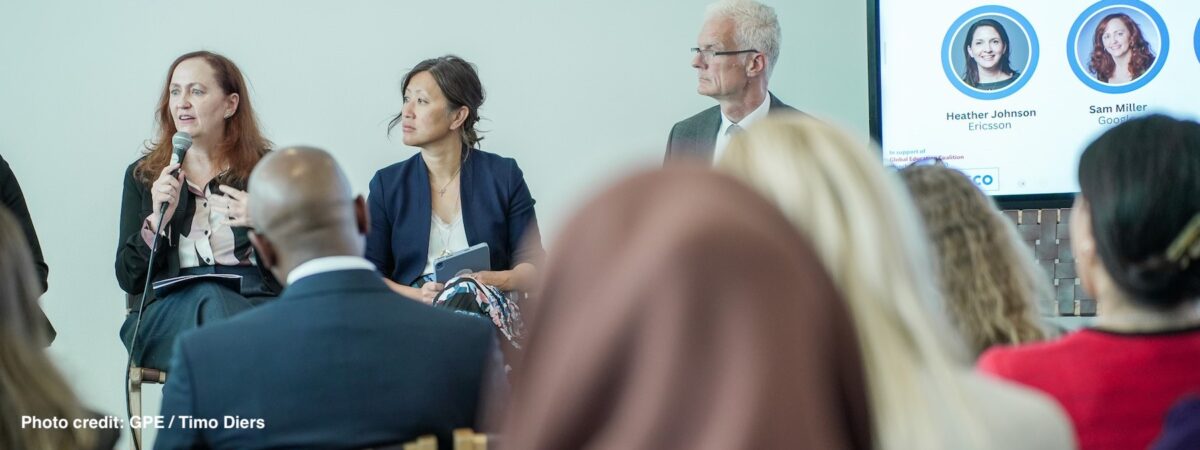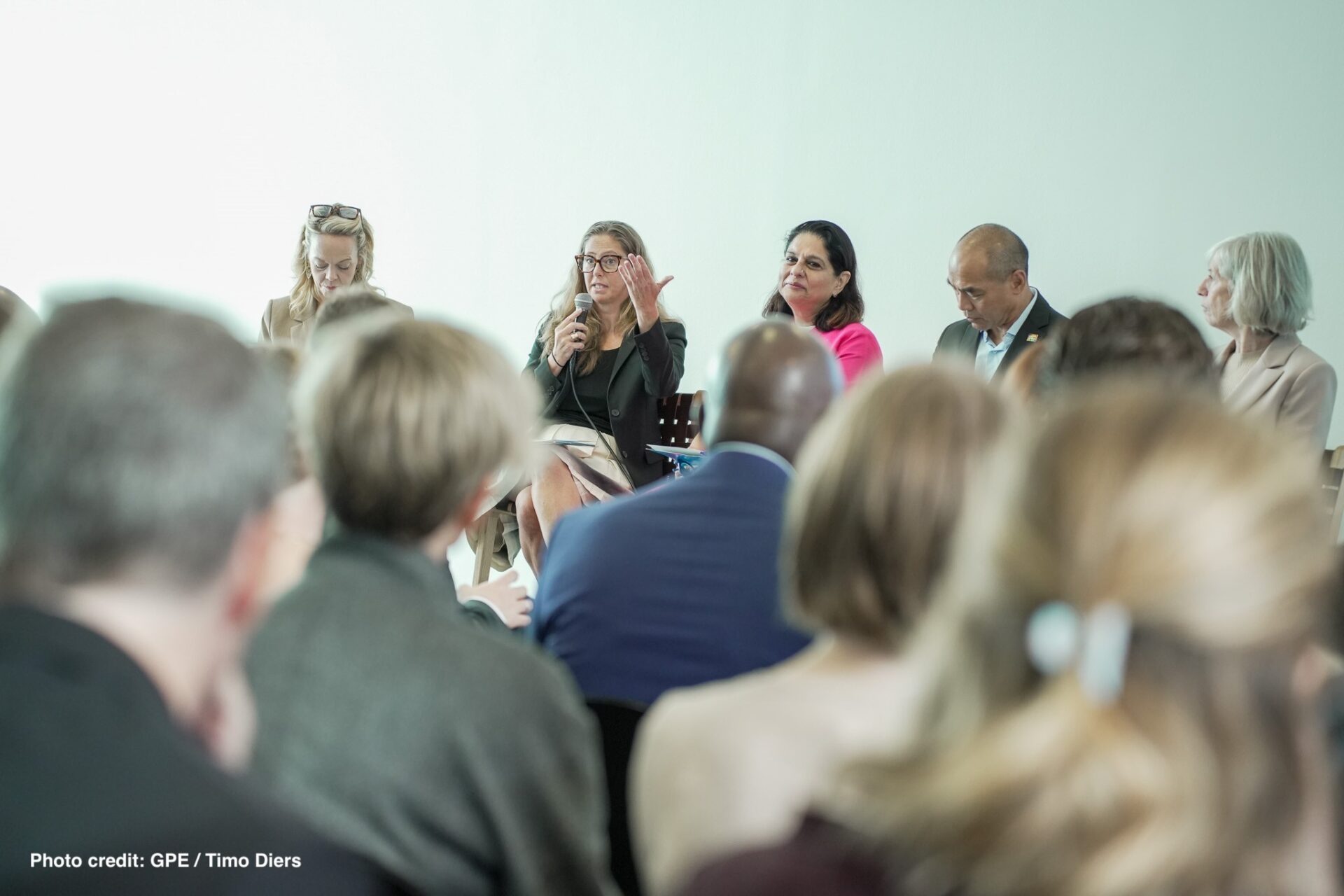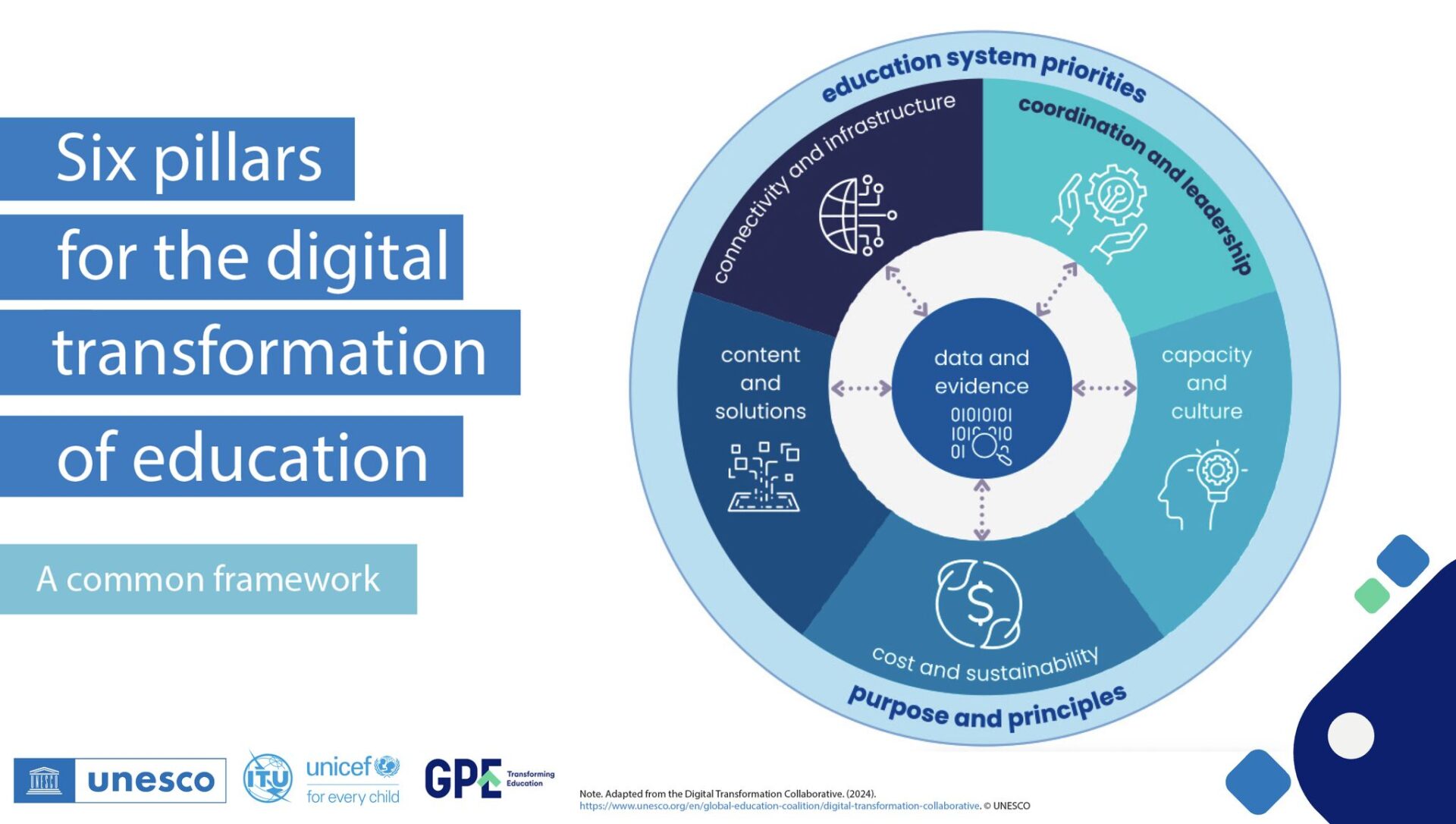
Digital Promise today announced that we have joined UNESCO’s Global Education Coalition (GEC) to support the digital transformation of education worldwide. The Global Education Coalition was launched by UNESCO in March 2020 to respond to the educational disruptions of the COVID-19 pandemic and to support recovery and transformation. Since then, its more than 200 members have worked collectively to impact 400 million learners and 12 million teachers across 112 countries.
A primary focus of Digital Promise’s membership in the GEC will be our involvement with the Digital Transformation Collaborative (DTC), a multistakeholder sub-group of the GEC committed to working together to help countries drive forward meaningful, holistic digital transformation in education. Chaula Gupta, vice president and chief program officer, and April Williamson, project director for global programs, will represent Digital Promise in the coalition.

April Williamson attended the Common Framework launch event hosted by UNESCO, UNICEF, ITU, GPE and Cambridge during the UN Summit of the Future Action Days in New York. During the workshop, breakout groups dove into each pillar to identify common challenges and priorities and how the DTC can support countries to put the framework into practice.
“Digital Promise Global has been shaping the future of learning through research, technology, and practice since our founding. We’re honored to have the opportunity to join forces with the GEC and DTC to share our work, learn from their members, and deepen our collective impact on learners across the world,” said Gupta.
The DTC recently published a Common Framework for a more sustainable, human-centered, balanced, and ethical digital transformation of education. The new framework outlines six pillars for positioning technology as an accelerator towards achieving national education priorities and advancing global educational equity.

UNESCO’s Digital Transformation Collaborative (DTC) recently launched a common framework for digital transformation consisting of six pillars, including coordination and leadership, connectivity and infrastructure, cost and sustainability, capacity and culture, content and solutions, and data and evidence.
Digital Promise’s work within the digital transformation space aligns closely with the framework put forth by the DTC. As such, Digital Promise has identified initial ways in which our work can support countries in operationalizing the framework’s six pillars.
Framework Recommendation: Develop and implement a clear, comprehensive, and adaptive digital transformation strategy with multi-stakeholder inputs and regular updates.
Digital Promise Strategy: Implementation Cohorts: To support global education system leaders to develop digital transformation strategies and take action on common challenges, Digital Promise is leading an 18-month Future of Tech-Enabled Learning Implementation Cohort that explores effective global practices to transform education using new technologies and pedagogical practices. This cohort includes U.S.-based district leaders from Digital Promise’s League of Innovative Schools, system leaders from Digital Promise’s Global Cities Education Network, and members of Ceibal’s network across Latin America.
Framework Recommendation: Where relevant, utilize low-bandwidth, online/offline, and/or fully offline digital learning solutions to ensure equitable accessibility of digital education for all students, regardless of connectivity.
Digital Promise Strategy: Offline-First Solutions: In Haiti, Digital Promise has teamed up with a coalition of partners, including Learning Equality (a fellow GEC and DTC member), to deliver culturally relevant digital content in Haitian Creole via Kolibri, their offline-first platform for teaching and learning. Education Development Center (EDC) summarized key results, lessons learned, and recommendations from the first year of implementation of this blended learning pilot program.
Framework Recommendation: Implement strategies to allocate financial resources
fairly across all schools and regions, addressing disparities and promoting equal access to digital tools and infrastructure.
Digital Promise Strategy: Outcomes Based Contracting: Digital Promise is building education leaders’ capacity around educational technology (edtech) procurement and financing. With outcomes-based contracting, schools and districts work with edtech providers to collaboratively identify a vision for how the products will move learners toward their goals and set pricing based on a set of contextual factors, including budget, student population, baseline data, and outcomes and metrics that will be used to measure success.
Framework Recommendation: Provide robust pre- and in-service training and continuous professional development opportunities for teachers and education leaders to effectively integrate technology into teaching, learning, and administrative practices, fostering a culture of peer-learning, recognition, and positive social impact.
Digital Promise Strategy: Learner Variability Project (LVP): The Learner Variability Navigator is a free online edtech tool that enables educators to identify research-based factors and strategies across a whole-child framework that best support their learners. Digital Promise also offers free professional learning resources and modules for educators to address learner variability in their classes. In addition, Digital Promise is working with Team4Tech (a fellow GEC and DTC member) to develop a model for adapting and piloting the learner variability tools across Team4Tech’s regional hubs in Asia, Africa, and Latin America.
Framework Recommendation: Develop and implement effective assessment and certification systems to evaluate and recognize learning, providing valuable credentials that support structured learning pathways that guide learners through their educational journey while ensuring continuity, progression and recognition of their learning experiences and milestones.
Digital Promise Strategy: Micro-credentials: Digital Promise has built an ecosystem of micro-credentials in partnership with issuers and earners around the world to personalize and recognize learning. Micro-credentials can provide students with credentials to verify their competencies that support their transition to employment, verify their global skills for employability such as career-ready communication, and more. Digital Promise’s free eBook (also available in Spanish) serves as a comprehensive resource for all interested in understanding micro-credentials, their role in the certification ecosystem, and the impact they have had.
Framework Recommendation: Demand and generate evidence on the social impact of technologies used in education by cultivating links between researchers, developers and education decision-makers to build trust and transparency, support efforts for testing education technologies and establish standards for compliance in data and information sharing.
Digital Promise Strategy: EdTech Quality Indicators: Digital Promise has teamed up with a coalition of leading education organizations to introduce five quality indicators for edtech and AI products. These indicators will help schools better determine if an edtech product is of sufficient quality to be used by teachers and students. Digital Promise’s edtech product certifications can also support leaders’ need to readily find quality products that support safe, equitable, and effective learning for all students.